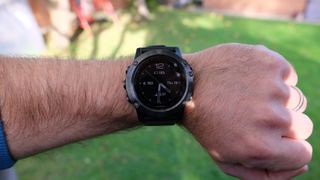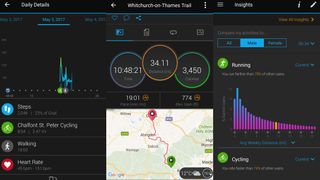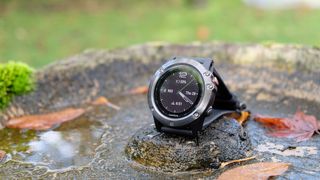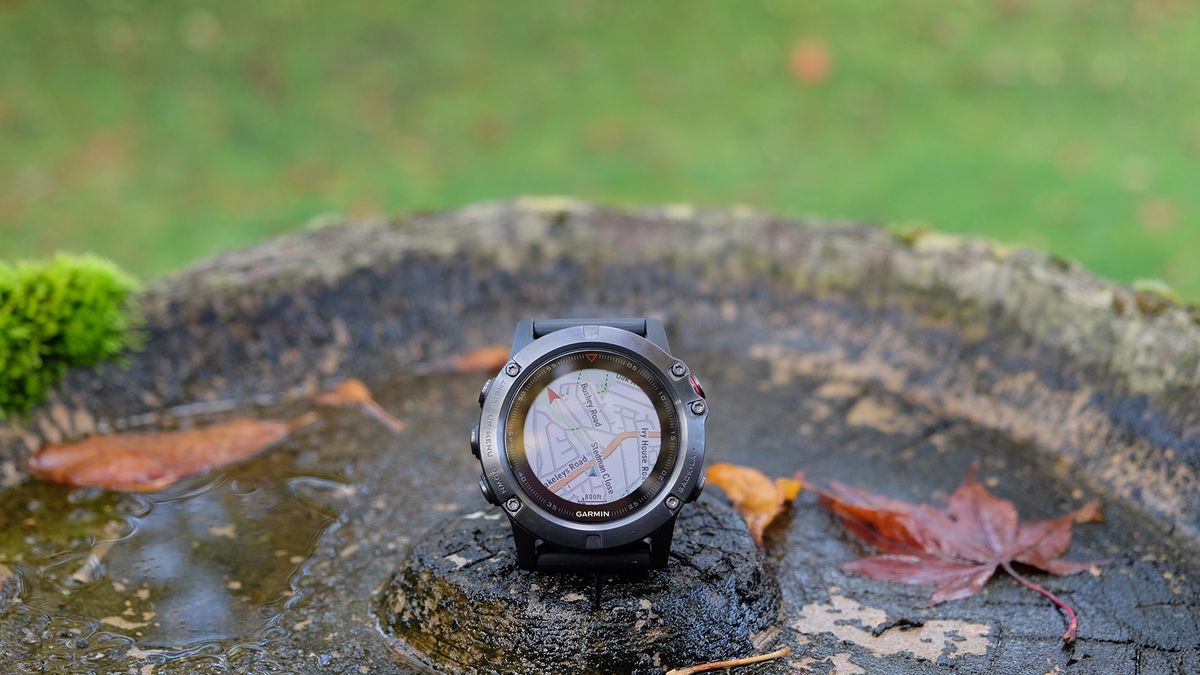TechRadar Verdict
The Garmin Fenix 5X has an enormous number of features, a long-lasting battery and an attractive albeit heavy build. It's expensive, but for serious outdoor enthusiasts it's hard to beat.
Pros
- +
Onboard maps
- +
Multi-sport support
- +
Attractive and rugged design
Cons
- -
A bit bulky
- -
Some find Connect app overwhelming
- -
Expensive
Why you can trust TechRadar
Update: Since this review was published Garmin has launched a new range of watches called the Garmin Fenix 5 Plus, Fenix 5S Plus and, the follow-up to this watch, the Fenix 5X Plus.
Garmin has been working for a long time to perfect the GPS sports watch and in the Fenix range it took a big step towards doing exactly that.
Now the Fenix 5X is here to bring that range to its pinnacle with onboard mapping, multi-sport tracking, smartphone notifications and much more. Has Garmin created that perfect watch it’s been working towards all these years?
Garmin has separated the Fenix 5 range into the Fenix 5S ($599 / £499 / AU$799) as the lighter and smaller model, the Fenix 5 as the middle ground ($599 / £499 / AU$799) and the Fenix 5X as the top-end model.
For those that want to use the watch as a daily wearer with activity tracking, the 5S is for them.
For those that want a little longer battery life, the Fenix 5 works. Then for the adventurer that wants to be prepared for anything there is the map-toting 5X.
Here we review the Fenix 5X, but bear in mind if you see us moaning about its size or price (which is high at $699.99 / £629.99 / AU$949) those other two and options are there to solve the issue - just at the cost of sacrificing maps.

Design
- Stylish but chunky
- Metal strap can be a hassle to fit
The Garmin Fenix 5X is a very attractive wrist adornment, that’s for sure. The exposed face screws, metal bezel and solid metallic buttons look gorgeous. The watch also feels premium-level weighty on the wrist - especially if you opt for the pricier metal strap.
That 51mm metallic strap is an issue though as it requires you to own the right tool or to go to a watch shop to have it adjusted to fit you. A hassle but something you only need do once (unless the watch is too successful in helping you lose weight).
Otherwise just go for the silicone strap, as that allows for size variance easily and can always be swapped with a quick release mechanism.
Whichever model you opt for, the Fenix 5X comes with a slate grey finish and a sapphire screen, the latter of which should mean a well-protected watch that won’t get easily scratched or damaged.






Specs, performance and tracking
- Loads of sensors and tracking tools
- Performs well, but heavy when running
Garmin is always updating its software and thanks to its own app store there are constant new software offerings available to make the watch do more. Onboard sensors include - deep breath - GPS, GLONASS, optical heart rate (HR), barometric altimeter, compass, gyroscope, accelerometer and thermometer. All that adds up to a lot of data to power all sorts of apps.
You get your basics like running, cycling and swim tracking, but also golfing, stand up paddle boarding, yoga and more. In real world use we found the stand up paddle boarding accurate for distance but stroke count was way off, jut to highlight a slight flaw in the mix.
This is a symptom that affects many Garmin watches in the pool as well, with stroke counts and lengths often not accurately recorded, although overall workouts are pretty well measured.
Where the Garmin Fenix 5X performed well was for outdoor adventuring, like hiking and hill climbing.
Here the full-color maps, auto climb data, storm alerts and points of interest, plus back to start navigation all worked well, although it wasn’t as great for running.

This watch is like wearing a weight on your arm when out on a run, especially if you opt for the 196g steel strap version - if you’re light we’d almost imagine you could end up running in circles from the weight on one arm.
Okay, realistically we’re being dramatic, but this weight does make the watch less able as a running device - but then you’re probably buying it for outdoor adventures anyway.
In fairness it is a capable run tracker, with details like vertical oscillation, ground contact time, cadence and even lactate threshold all measured out.
Day to day step tracking is accurate, and it also takes a stab at your calories, but the watch itself can get annoying at times if you have sleeves and want to tuck it away.
This main way to think about the Fenix 5X is: this is definitely designed as a fashion statement where being big is key, so if you like that then you’ll love this device.
Compatibility, app and battery life
- Useful but cluttered app
- Very long-lasting battery
The Garmin Connect app lets you check out all your exercise data immediately on a connected phone or in more detail on a computer.
The app, which is available on both Android and iOS, is easy to use and navigate and gives in-depth charts you can edit to see what you need, like heart rate overlaid on hill height for example.
But since the Garmin Connect app is built to cover all the company’s various wearables, you might find it a little cluttered. It is possible to personalize the layout but it takes time and effort.
If that all proves too much for you then you can always export the GPX file for use in other platforms like MapMyRun or MyFitnessPal, if you’re already committed to using those.

For cyclists, Strava compatibility is built in with features like beacon and live segments right there on the watch as you train. You can then easily have these uploaded, as the watch auto uploads data over Wi-Fi when you get in.
But looking at your wrist while on a ride is awkward, despite the big, clear screen. We found strapping the watch to the frame worked, but may require padding to stay facing you if your bar tape is thin, and you also lose heart rate if you don’t have a HR strap.
Battery life on the Fenix 5X is one of the best of any wearable out there, especially one with this much data being collected. The official numbers say you get up to 20 hours of use in full GPS mode and up to 35 in UltraTrac mode, which pings the GPS less regularly.
This seemed accurate in our experience - in fact we may have even got longer out of it than listed, suggesting Garmin is being frugal with its estimates.
As for general daily use, Garmin says the Fenix 5X will go for 12 days. Using the smartphone connection for notifications, tracking daily activity and training a few times a week for at least an hour we found the watch didn’t need a charge for nearly two weeks, making this 12 days claim pretty accurate.

Verdict
This is one of the best GPS sports watches available right now. It’s rugged, well connected, covers lots of sports, includes color maps and has brilliant battery life.
Plus you can use this as a daily activity tracker without worry of damage thanks to that sapphire screen and water resistance rating to 100 meters. You’ll look good too thanks to that chunky metallic build.
Who's this for?
If you’re a fan of the outdoors then this is the map, tracker, storm alerter and notification giver for you. If the size and price don’t scare you off then this is a super capable running, cycling and swimming tracker too - plus any other sport you want it for.
The only real downside, as you may have noticed us mention, is size. It’s too big for some - but then there is always the option to go for the Fenix 5 or Fenix 5S if you can live without the maps.
Should you buy it?
If you have that much cash spare and want a GPS and activity tracker that does it all, this is worth the money. Since it has so many sensors and constant software update support you’ll be able to happily live with this for many years to come.
If you don’t need those maps though you might want to consider a Garmin Forerunner 935, which is far smaller, more affordable and tracks lots and lots of sports capably.
First reviewed: October 2017
Luke is a freelance writer and editor with over two decades of experience covering tech, science and health. Among many others he writes across Future titles covering health tech, software and apps, VPNs, TV, audio, smart home, antivirus, broadband, smartphones, cars and plenty more. He also likes to climb mountains, swim outside and contort his body into silly positions while breathing as calmly as possible.

Samsung and Meta are looking into earbuds with cameras, following Apple’s AirPods’ lead

Trump pardons Silk Road dark web market creator Ross Ulbricht

John Malkovich and The Bear’s Ayo Edebiri get swept up in a pop music cult in first trailer for A24’s Opus – and it's gone straight to the top of my watch list
